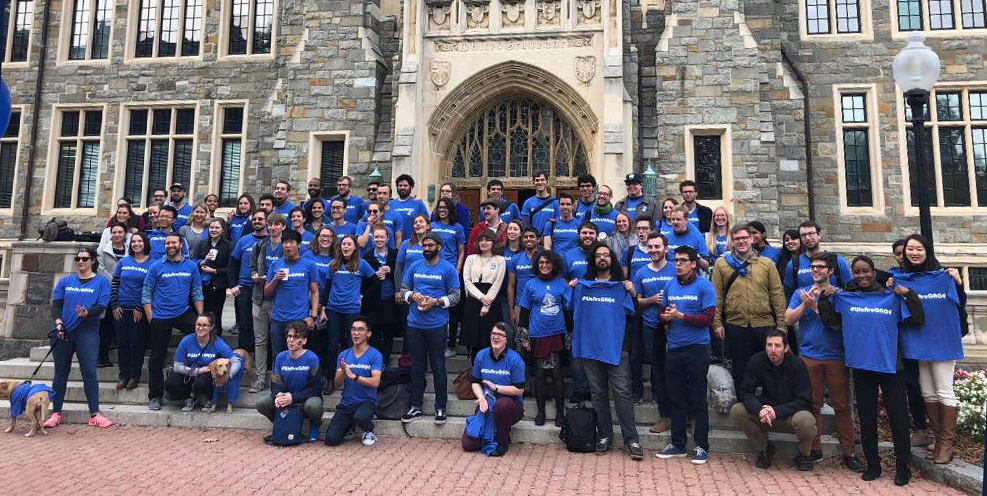The Georgetown Alliance of Graduate Employees has entered into negotiations with Georgetown University by engaging in weekly bargaining sessions in an attempt to finalize its first union contract.
Every Tuesday for the rest of the semester, members of GAGE’s bargaining committee will speak with administrators in an attempt to reach an agreement on a union contract to go into effect for the fall 2020 semester, according to the GAGE website.

GAGE hopes graduate student workers will attend the bargaining sessions to stand in solidarity with their fellow students, according to a Jan. 20 update posted on the GAGE website.
“By attending a bargaining session, you can learn more about the graduate experience at Georgetown and show your support for your friends and colleagues at the table,” the update read. “More importantly, you can remind the administration that you and hundreds of graduate employees like you will do what it takes to win a contract.”
Going into contract negotiations this semester, GAGE’s bargaining committee will emphasize specific areas of focus highlighted by responses to its January 2019 bargaining survey, which flagged key concerns of graduate employees, members and nonmembers of GAGE. These areas of focus include increased worker compensation, expanded health care coverage and improved reporting processes for harassment and discrimination, according to GAGE bargaining committee member Jewel Tomasula, who is pursuing a doctorate of philosophy in the department of biology.
Finding ways to relieve the burden of health care costs for graduate students will be a priority in the upcoming negotiations, according to Tomasula.
“Most graduate workers’ only source of income and only option for healthcare is what Georgetown provides,” Tomasula wrote in an email to The Hoya. “However, the stipends for PhD students and wages for hourly work are far below livable wages for DC, and the student healthcare options pose a financial burden.”
The university has already reached tentaive agreements with GAGE on proposals regarding management rights, union rights, grievance and arbitration procedures and procedures to address claims of discrimination and harassment, according to a university spokesperson. During the bargaining sessions, GAGE and university administrators will negotiate over topics including service hours, stipend levels for students who are serving as research or teaching assistants and benefits, according to a university spokesperson.
The university would like to reach a collective bargaining agreement by the end of this spring semester, a university spokesperson wrote in a statement to The Hoya.
“Georgetown University shares GAGE’s belief in the important role that graduate student assistants play and shares its commitment to giving them a strong voice as members of our community,” the university spokesperson wrote. “In order to respect the collective bargaining process, discussions on all matters subject to negotiation should take place at the bargaining table.”
GAGE voted to unionize in November 2018 following a yearlong push to receive official recognition as a union from the university. GAGE elected 14 members to the union’s bargaining committee Feb. 8, 2019 in preparation for the beginning of worker contract negotiations with the university.
The salary and stipends offered to graduate student workers are not sufficient to cover rent and other expenses, according to bargaining committee member Marya Hannun, a seventh year Ph.D. student in the Islamic studies department, who has worked as a teaching assistant while pursuing her degree.
“Currently, we don’t have the protections or salary to make pursuing a phd easy for someone without a safety net or with any sort of dependents,” Hannun wrote in an email to The Hoya. “I’m so privileged to have that safety net of parents who can help me out, but I want a contract so people who don’t have those safety nets can also do this work.”




















